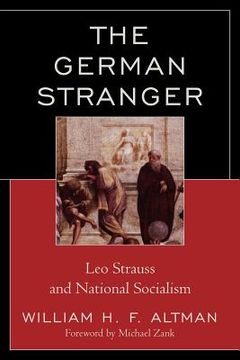Compartir
the german stranger: leo strauss and national socialism (en Inglés)
Xxwilliam H. F. Altmanxx
(Autor)
·
Michael Zank
(Prefacio de)
·
Lexington Books
· Tapa Blanda
the german stranger: leo strauss and national socialism (en Inglés) - Altmanxx, Xxwilliam H. F. ; Zank, Michael
$ 145.210
$ 242.020
Ahorras: $ 96.810
Elige la lista en la que quieres agregar tu producto o crea una nueva lista
✓ Producto agregado correctamente a la lista de deseos.
Ir a Mis Listas
Origen: Estados Unidos
(Costos de importación incluídos en el precio)
Se enviará desde nuestra bodega entre el
Viernes 10 de Mayo y el
Martes 21 de Mayo.
Lo recibirás en cualquier lugar de Chile entre 1 y 3 días hábiles luego del envío.
Reseña del libro "the german stranger: leo strauss and national socialism (en Inglés)"
Leo Strauss's connection with Martin Heidegger and Carl Schmitt suggests a troubling proximity to National Socialism but a serious critique of Strauss must begin with F. H. Jacobi. While writing his dissertation on this apparently Christian opponent of the Enlightenment, Strauss discovered the tactical principles that would characterize his lifework: writing between the lines, a faith-based critique of rationalism, the deliberate secularization of religious language for irreligious purposes, and an all or nothing antagonism to middling solutions. Especially the latter is distinctive of his Zionist writings in the 1920s where Strauss engaged in an ongoing polemic against Cultural Zionism, attacking it first from an orthodox, and then from an atheist's perspective. In his last Zionist article (1929), Strauss mentions the Machiavellian Zionism of a Nordau that would not fear to use the traditional hope for a Messiah as dynamite. By the time of his change of orientation, National Socialism was being led by a nihilistic Messiah while Strauss had already radicalized Schmitt's political theology and Heidegger's deconstruction of the ontological Tradition. Central to Strauss's advance beyond the smartest Nazis is his Second Cave in which he claimed modern thought is imprisoned: only by escaping Revelation can we recover natural ignorance. By using pseudo-Platonic imagery to illustrate what anti-Semites called Jewification, Strauss attempted to annihilate the common ground, celebrated by Hermann Cohen, between Judaism and Platonism. Unlike those who attacked Plato for devaluing nature at the expense of the transcendent Idea, the émigré Strauss effectively employed a new Plato who was no more a Platonist than Nietzsche or Heidegger had been. Central to Strauss's Platonic political philosophy is the mysterious protagonist of Plato's Laws whom Strauss accurately recognized as the kind of Socrates whose fear of death would have caused him to flee the hemlock. Any reader who recognizes the unbridgeable gap between the real Socrates and Plato's Athenian Stranger will understand why "the German Stranger" is the principal theoretician of an atheistic re-enactment of religion, of which genus National Socialism is an ultra-modern species.
- 0% (0)
- 0% (0)
- 0% (0)
- 0% (0)
- 0% (0)
Respuesta:
Todos los libros de nuestro catálogo son Originales.
Respuesta:
El libro está escrito en Inglés.
Respuesta:
La encuadernación de esta edición es Tapa Blanda.
✓ Producto agregado correctamente al carro, Ir a Pagar.

